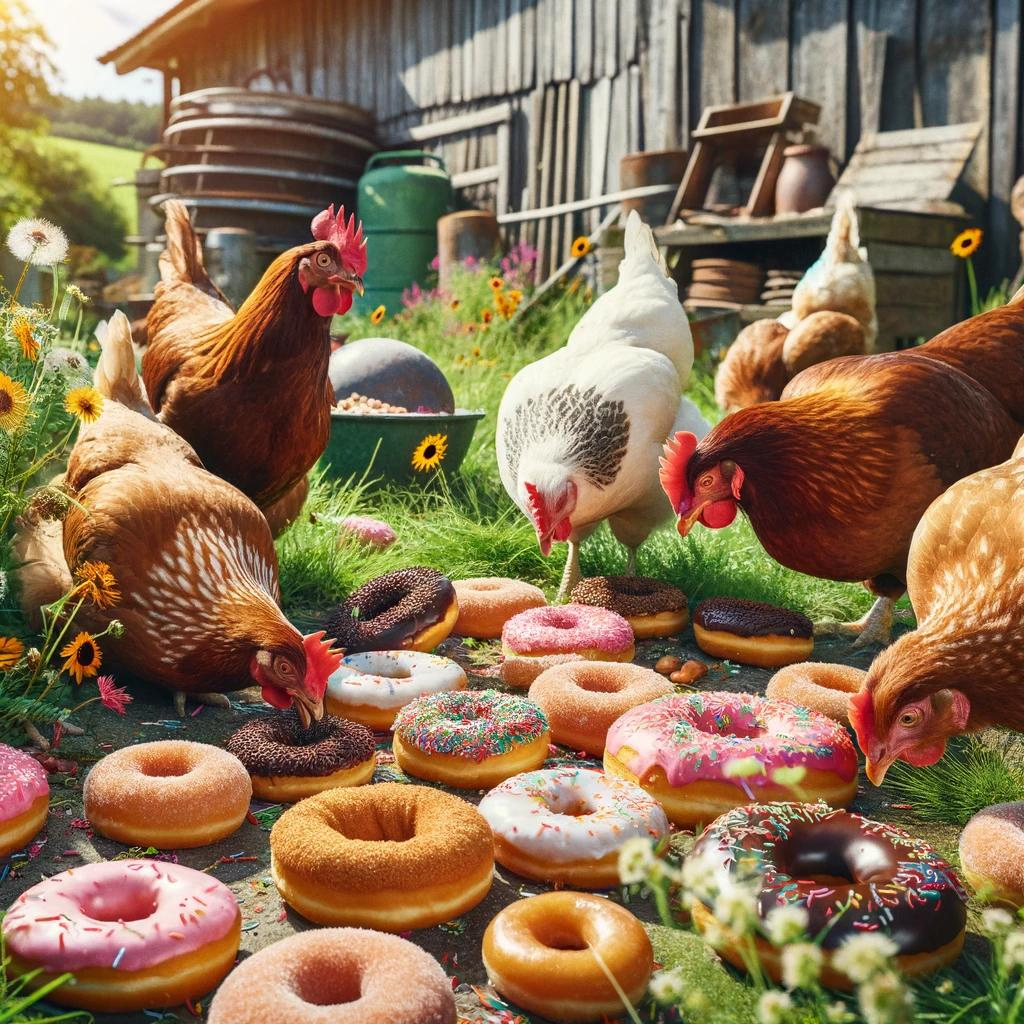
Chickens can technically consume donuts, but it’s not recommended. Donuts lack nutritional value for chickens and can lead to health issues if fed regularly. While they may nibble on small amounts, it’s best to avoid as a staple food.
Are Donuts Safe for Chickens to Consume?
Donuts aren’t inherently toxic to chickens, but they’re not an ideal dietary choice. The high sugar, fat, and processed ingredients can upset a chicken’s digestive system and lead to obesity or other health problems over time.
Can Chickens Eat Plain Donuts?
Plain donuts without any additional toppings or fillings are marginally better than those with added sugars or fats. However, they still lack essential nutrients and shouldn’t be a regular part of a chicken’s diet.
Can Chickens Eat Frosted Donuts?
Frosted donuts contain additional sugar and potentially harmful additives in the frosting, making them even less suitable for chickens. Excessive sugar consumption can disrupt a chicken’s metabolism and lead to weight gain or other health issues.
Can Chickens Eat Donuts with Filling?
Donuts with fillings like jam or cream are even less advisable for chickens. The sugary fillings can cause digestive upset and may even pose a choking hazard for birds. It’s best to avoid giving them to chickens altogether.
Can Baby Chicks Safely Eat Donuts?
Baby chicks have delicate digestive systems that are particularly sensitive to sugary or fatty foods. Feeding them donuts can disrupt their growth and development and should be avoided entirely.
Should Donuts Be Given to Chickens as a Treat?
While an occasional small piece of donut might not harm chickens, it’s not a recommended treat. Healthier options like fruits, vegetables, or grains are better choices for providing treats that won’t compromise a chicken’s health.
Can Donuts Provide Nutritional Benefits to Chickens?
Donuts lack essential nutrients necessary for chickens’ health. While they contain calories, they’re high in sugar and fat and lack protein, vitamins, and minerals vital for chickens’ growth, egg production, and overall well-being.
Can Donuts Be Harmful to Chickens?
Yes, donuts can be harmful to chickens if consumed regularly or in large quantities. Their high sugar and fat content can lead to obesity, diabetes, and other health issues in chickens, compromising their longevity and productivity.
Can Chickens Overindulge in Donuts?
Chickens can overindulge in donuts if given the opportunity, as they may find the taste appealing. However, excessive consumption can lead to health problems such as obesity, digestive issues, and metabolic disorders in chickens.
Can Donuts Cause Digestive Issues in Chickens?
Yes, donuts can cause digestive issues in chickens due to their high sugar and fat content. Consuming large amounts of sugary or fatty foods can upset chickens’ stomachs, leading to diarrhea, bloating, or even gastrointestinal blockages.
Can Chickens Eat Stale Donuts?
Stale donuts may be less palatable to chickens, but they’re not necessarily safer or healthier. While they may not pose an immediate danger, stale donuts still lack nutritional value and can contribute to health issues if consumed regularly.
Can Chickens Eat Donuts with Nuts or Chocolate?
Donuts with nuts or chocolate are even more hazardous to chickens. Chocolate contains theobromine, which is toxic to chickens, and nuts can pose a choking hazard or digestive obstruction. It’s best to avoid feeding them such varieties.
Can Donuts Be Mixed with Other Chicken Feed?
Mixing donuts with other chicken feed is not recommended. Donuts do not provide the essential nutrients chickens need, and combining them with regular feed can dilute the overall nutritional value of the diet, leading to deficiencies.
How Should Donuts Be Introduced to Chickens’ Diet?
Donuts should be introduced sparingly and as an occasional treat rather than a regular part of the diet. They should be offered in small quantities, preferably broken into pieces, to prevent overconsumption and minimize potential health risks.
*Always speak with your veterinarian before adding a new food to your chicken’s diet.